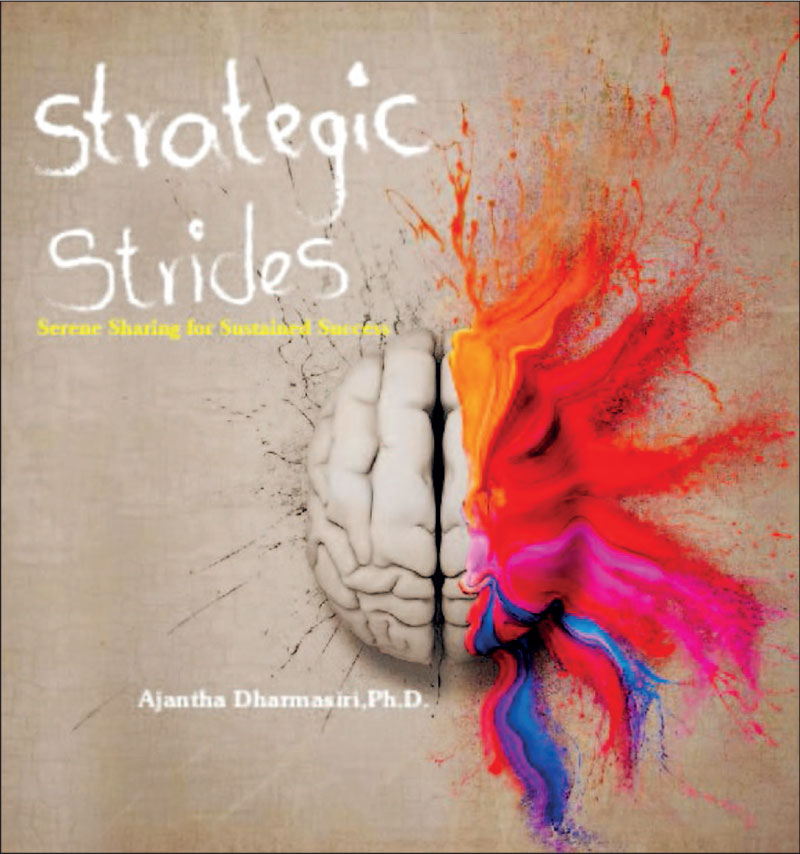Tuesday Feb 17, 2026
Tuesday Feb 17, 2026
Monday, 6 June 2022 00:30 - - {{hitsCtrl.values.hits}}

 I am so pleased to share the publication of my 10th book. It took such a long time to come out from the press due to the prolonged paper shortage. Despite the doom and gloom around, the current turbulence invites us to stay focused and to be positive and energetic. Today’s column reflects on the salience of ‘Strategic Strides’ as a serene sharing for sustained success.
I am so pleased to share the publication of my 10th book. It took such a long time to come out from the press due to the prolonged paper shortage. Despite the doom and gloom around, the current turbulence invites us to stay focused and to be positive and energetic. Today’s column reflects on the salience of ‘Strategic Strides’ as a serene sharing for sustained success.
Overview
Strategic Strides is a collection of articles I wrote to Daily FT and Sunday Observer. It contains 30 such strides. They illustrate issues with insights involving individuals, interactive teams, and institutions. Practicing managers have been the centre of focus in such discussions, with relevance to other readers as well. I have proposed a “four R” approach in getting the best out of Strategic Strides.
Recognise salient features of people at diverse workplaces
Reflect on the main challenges associated with managing people in obtaining expected results
Relate the basic concepts covered to the current issues faced by the reader’s workplace
Reinforce the way how one professionally deals with people
The intention of mine was to offer the readers a significant satisfaction of understanding the key concepts and appropriately applying them. “The peak efficiency of knowledge and strategy is to make conflict unnecessary,” so said Sun Tzu. The 30 strides contained in the book deals with an array of contemporary issues with people factor in the forefront.
Remembering with gratitude
Strategic Strides became a reality because of some special people who inspired me to produce it. First of all, Rev. Professor Aloysius Pieris, s.j., Director of the Tulana Research Center, whom I met 38 years ago, was the one who ignited the writer in me. Anura Siriwardena, the founder editor of Vidusara Science Journal, needs a special mention as my teacher in journalism. Late Professor Uditha Liyanage, Former Director, Postgraduate Institute Management has always been a source of inspiration for me with his conceptual brilliance and communication excellence.
I cannot forget the assistance by Nisthar Cassim, the Editor of Daily Financial Times and Dinesh Weerawansa, the Editor of Sunday Observer in not only publishing my columns but also encouraging me to publish them as volumes. I would like to pay tribute to all my teachers who shaped my managerial profile. Late Prof. Sudaththa Ranasinghe deserves a special mention. Let me acknowledge the encouraging support from my academic and non-academic colleagues of the Postgraduate Institute of Management (PIM). Let me also thank Sirisumana Godage and the dedicated team of Godage Publishers for their quality output.
I remember my late parents, Ernest Dharmasiri, and Gammanpilage Dona Clara with a deep sense of gratitude. In hindsight, I can see the tremendous contribution from my father being an English teacher and mother being a Mathematics teacher, for me to develop both sides of my brain. I am failing in my duty without a very special note on my family. Dr. Ruklanthi Hettiarachchi, my wife has always been committed as my caring critique in shaping me better as an effective communicator. I dedicated this book to her, my soul mate, who serenely journeyed with me during the past 25 years, in strategically being a part of my sustained success. Navodi, elder daughter, of late, has started following her mother in doing the same with affection. Nadeepa, my tech-savvy son was my high-tech guide with high-touch till his demise. All of you made me where I am today.
Essence of Strategic Strides
It is all about strategy. Stride is a walk with long, decisive steps in a specified direction. That is what we will deliberate in this collection. As an organisation as well as a nation, we need to be strategic with future success in mind. As Eleanor Roosevelt said, “The future belongs to those who believe in the beauty of their dreams.” This volume is an invitation to dream vividly and to deliver value in making the dream a reality.
Strategy is an often confusingly used term that may mean different things to different people. I have seen this happening in Sri Lanka, where crafting and executing strategy is cluttered by myriad jargons. We need clarity and commitment towards formulating and implementing strategy at corporate level as well as country level. It is people who design and deliver in driving results. To recover the economic growth through a multi-sectoral approach with professionalism in action is a timely need for Sri Lanka.
“It seems that we are over-led and under-managed,” says Mintzberg. Many may disagree. Yet, you cannot undermine this candid Canadian veteran. Having contributed to management in proposing 10 key managerial roles way back in 1971, he is sharp and sensible in his criticism.
Strategy at the helm
We as a nation are at crossroads with a severe socio-economic crisis. The vibrant youth have come to the forefront in clamouring for a true system-change. Sri Lanka as a nation should move ahead with an authentic vision taken seriously towards prosperity. The so called “Vision 2025” of being a “country enriched” stated that “we will do so by transforming Sri Lanka into the hub of the Indian Ocean, with a knowledge-based, highly competitive, social-market economy”. The execution of it has been obviously questionable. The same plight appears to be the grim reality with the “vistas of prosperity and splendour.”
I recall the statement made by the Malaysian High Commissioner in Sri Lanka at the Fire Side Chat with leading foreign envoys held in Colombo. He referred to the consistent tourism strategy adapted by Malaysia with one solid slogan for the past 25 years. “Malaysia Truly Asia.” We, in contrast, have changed our slogan almost every year based on the likes and dislikes of those who are at the helm. A lot of food for thought with regard to consistency and continuity. It reminds me of what Joel Barker said. “Vision without action is a daydream. Action without vision just passes by. Vision with action will create the desired future”.
Living the strategy
Being strategic is of utmost importance in the business context. It essentially shows how “smart” you are in “playing the game.” The roots are from the Greek word ‘strategios’, which means the art of the General. Obviously, it has a military connotation. How a general orders the troops to attack, or to withdraw or to surround the enemy, with the aim of winning the war in mind. A battle front and a business front have a lot in common, particularly with the sky-rocketing competition, globally as well as locally.
A game plan cannot be conceived or commissioned without people. In any organisation, we have physical, financial and information resources. All those three resources are not of any use if you do not have the most precious resource, its people. That is exactly, why people, to be precise the “right” people are the most precious asset to any forward-looking organisation. How to acquire, retain, develop, and engage them have become increasingly challenging with the growing complexity associated with doing business in a globalised world. Hence, managing human resources has become a critical factor for organisational success.
“If ‘people are our greatest assets’, it’s time to make strategies that people can live in,” so says Prof. Lynda Gratton of London Business School. “People are our most important asset.” “We are a knowledge-based company.” “All we have is our people.” These are statements that we hear ever more frequently from more and more companies. Yet too many of the people who populate our companies, the reality of organisational life is that people do not feel they are treated as the most important asset, and they do not feel their knowledge is understood or used. As Prof. Gratton emphasises, it is time we kept human capital where it really deserves to be.
“The only route to improved performance is by placing human resource at the centre of your strategic decision-making,” argues Linda. “Living Strategy” shows you why and how to design strategies that have meaning and purpose for people, without whose commitment they remain drawings on the board-room wall chart. She suggests that a new management agenda is crucial and shares the three tenets of human organisational behaviour.
For corporate strategy to live and work, people must understand strategy, and strategy makers have to understand people. Prof. Lynda Gratton stresses the need to be aware of the “why” and “how” of putting people at the heart of corporate strategy. If companies want to increase their business performance, they need to recognise and develop the soul of the organisation.
Way forward
As we saw, strategy formulation and execution should be confidently handled by competent people. The choice of connections over the competencies has been a perennial issue in the local arena, particularly in the public sector. There was a time when kith and kin of those who are at the helm appeared to be the favourites, with regard to filling the key positions. Has that custom really changed with the regime changes? Or has one set of loyalists have been replaced by another set of loyalists with same basis as the selection criteria? Is it a case of consolidating power in offering powerful positions to favourites irrespective of their potential to perform? Such questions pose several points to ponder.
It reminds me of what Confucius said a long time ago: “The will to win, the desire to succeed. The urge to reach your full potential – these are the keys that will unlock the door to personal excellence.”
The book, Strategic Strides offers you an assortment of serene sharing towards meaningfully engaging the precious human resources with care and clarity. It is a matter of envisioning the future and endeavouring to make it a reality. The twin challenges of employee wellbeing and enterprise progress can be balanced by ensuring humane results. With crafting and executing right strategies, the required progress can be realised.
(The writer is the immediate past Director of Postgraduate Institute of Management, and can be reached through [email protected], [email protected] or www.ajanthadharmasiri.info.)